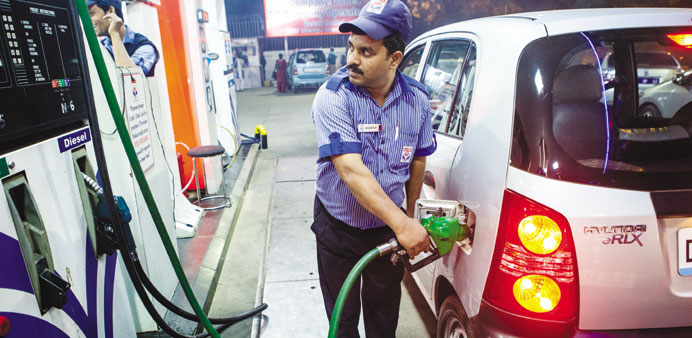An employee refuels a vehicle at a Hindustan Petroleum gas station in New Delhi. Indian refiners owe $3.6bn to National Iranian Oil Co.
India is set to pay Iran $1.65bn over the next three months under an interim nuclear deal that eases sanctions on Tehran and gives it access to $4.2bn in blocked funds, four sources with knowledge of the matter said.
As long as Tehran complies with the terms of its preliminary agreement with western powers, which took effect on January 20, Iran receives some of its funds frozen abroad in eight payments from various buyers over six months.
Iran has cut its most sensitive nuclear stockpile by nearly 75% in implementing the pact, the International Atomic Energy Agency said in its latest report, as the Opec member allays fears about its atomic aims.
This means Tehran will have access to the next two instalments, each of $550mn, which are due on May 14 and June 17. The final $550mn instalment, due on July 20, is contingent on confirmation that Iran has fulfilled all of its commitment.
The Indian government has asked refiners to make the first payment by mid-May, three of the sources said, adding that refiners will settle all three tranches if payment is allowed by the US and European Union.
“The individual companies’ share is to be worked out,” one of the sources said.
Iran has so far received $2.55bn in frozen oil funds, in five payments, four from Japan and one from South Korea.
Three of the sources said Iran had asked India to make payments into the Central Bank of Iran’s account with Oman’s Bank Muscat in Omani rials.
“All I can confirm is that some movement is happening on payments by India to Iran, but the modalities as to which bank will be used by India to remit funds is yet to be worked out,” said a western diplomat privy to the matter, who was not one of the four previously cited sources.
Indian refiners Essay Oil, Bangalore Refinery and Petrochemicals, Hindustan Petroleum Corp and HPCL-Mittal Energy together owe $3.6bn to National Iranian Oil Co.
The tough sanctions slapped on Iran in 2012 closed banking channels for the transfer of oil payments to the Opec member country, putting a stranglehold on its revenue, crippling its economy and ultimately bringing it to the negotiating table. Indian buyers of Iranian oil have been settling 45% of payments in rupees, which Iran used for importing goods from India, while the refiners held the remainder.
Before the interim deal, countries that imported Iranian oil were required to steadily reduce their purchases to qualify every six months for a waiver from US sanctions.
Iran’s crude oil exports fell for the first time in five months in March and are slated to drop further in April, moving closer to the levels stipulated by the November interim deal.
That agreement allows Iran to keep exporting at current reduced levels of about 1mn bpd and opens a door for lifting shipment volumes later.
Iran’s top four oil clients – China, India, Japan and South Korea – together cut oil imports from Iran by 15% to an average of 935,862 barrels per day (bpd) in 2013, government and industry data showed.
India’s intake of Iranian oil surged nearly 43% in the first quarter of 2014, bringing a warning from the US that it needed to hold the shipments closer to end-2013 levels of 195,000 bpd.

